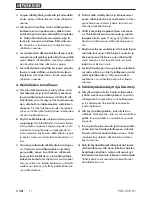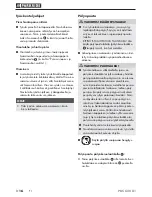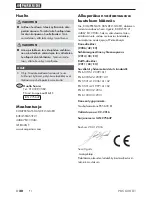
GB
│
IE
│
5
■
PBS 600 B1
5. Service
a)
Have your power tool serviced by a qualified
repair person using only identical replace-
ment parts.
This will ensure that the safety of
the power tool is maintained.
Appliance-specific safety instructions
for sanders
■
Only hold the appliance using the insulated
handle surfaces, as the abrasive belt can
damage its own power cable.
Contact with a
live wire may apply voltage to exposed metal
parts of the power tool and could give the oper-
ator an electric shock.
WARNING!
■
Dusts from materials such as leaded paint,
some types of wood and metal can be harmful
to your health.
■
Contact with or inhalation of these dusts can
represent a health hazard for the person
operating the appliance and other people
in the vicinity.
■
Wear safety goggles and a protective dust
mask!
Operation
Tensioning/replacing the abrasive belt
WARNING – RISK OF INJURY!
■
Always remove the power plug from the wall
socket before carrying out any work.
1. Loosen the clamping appliance for the abrasive
belt by swivelling the clamping lever com-
pletely out (see Fig. B). The abrasive belt
can now be removed.
2. Now attach a new abrasive belt or one
suitable for another material or with a different
grain size.
IMPORTANT:
The direction of the arrows on
the inside of the abrasive belt and on the
appliance housing must match.
3. Push the clamping lever back to its original
position.
Manually adjusting the abrasive belt :
If the abrasive belt does not run centrally after
switching on, you will have to adjust the belt tracking
manually.
♦
To do this, turn the adjusting screw on the
front roller until the abrasive belt runs
centrally.
IMPORTANT:
It is imperative to ensure that
the abrasive belt does not rub against the
housing. Check the belt tracking regularly,
and readjust it using the adjusting screw if
necessary.
Summary of Contents for 275647
Page 3: ...A B C 10 11 13 14 12 ...
Page 45: ... 42 PL PBS 600 B1 ...









































